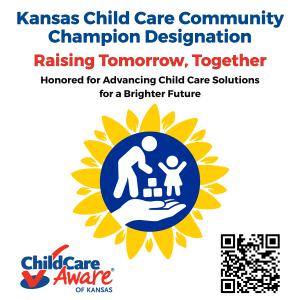
Child Care Aware of Kansas Honors 66 Communities as Child Care Community Champions
Child Care Aware of Kansas Honors 66 Communities as Child Care Community Champions Salina, Kansas – February 12, 2026 Child Care Aware of Kansas is

Child Care Aware of Kansas gathers and disseminates data, research, and best practices from experts in the field so that parents, providers, and decision-makers are equipped with ideas and solutions for high-quality early care and education.
All families deserve equitable and consistent access to high-quality early care and learning opportunities. Unfortunately, child care availability varies widely across Kansas.
Our comprehensive point in time data, organized by county, is meant to assist local communities — including families, employers, and other community leaders — as they work to address critical child care shortages.
Select your county below to retrieve information about the status of child care supply and demand in your area. You’ll also find information about the different types of child care available, rates for part-time and full-time care, census data, and more. The best part: The numbers are up-to-date from the moment you click.

This online tool is positioned to guide policy and help measure impact of the following early childhood services in Kansas: childcare, home visiting, Pre-K, and Part C (early intervention services for infants and toddlers ages birth through 2 with disabilities and their families).
The dashboard provides an interactive portal where users can easily customize their search of early childhood program data. The dashboard is a critical step for state and local administrators to build a more data- and equity-informed understanding of early childhood services as a whole and to be dynamic in response to the need and participation of their specific services.
In order to inform stakeholders and decision-makers, we publish a yearly report on the state of child care in Kansas — including key data on child care capacity across the state, the types of providers available, and counties experiencing critical needs.
Trends, Challenges, Opportunities
After a brief rebound in 2023, Kansas is once again seeing a decline in the number of child care programs. While child care centers are on the rise—with 28 new programs added—family child care homes are shrinking, with 115 lost in just one year. Since these home-based programs make up more than 70% of all licensed care in the state, the impact is significant.
Explore the full report to see what these shifts mean for families, providers, and communities across Kansas.
The 2024 Annual Report highlights the impact Child Care Aware of Kansas has made over the past year, showcasing our commitment to strengthening child care systems and supporting families, providers, and communities across the state.
In this report, you’ll find key data, stories of success, and insights into the programs and initiatives that are shaping a brighter future for Kansas children. From expanding access to quality care to empowering providers with essential resources, the report reflects the collective efforts of our team, partners, and communities working together.
Explore the 2024 Annual Report to see how we’re driving innovation, fostering collaboration, and making a lasting impact on the child care landscape in Kansas.

Every day, our state pays for the lack of quality, inclusive child care options for Kansas kids. The steepest costs, often overlooked, adversely impact the state’s long-term prosperity. Without quality early care and education, many children won’t have the support to develop the strong social-emotional foundation that facilitates lifelong learning, well-being, and success. These conditions limit opportunities for children and adults to live healthy lives, resulting in:
Building a quality early care and education system is more cost-effective than trying to address and pay for the challenges caused by our current patchwork system.
Fortunately, thanks to collaborative community-driven efforts, innovative pilot projects, and long-term academic studies, we know what quality early care and education looks like.
Improving this system can drive our economy in the short term by enabling more parents to seek employment and work without disruption — improving families’ financial stability, reducing turnover, and increasing productivity for Kansas businesses, as well as welcoming diverse residents to be a part of and contribute to our communities. By listening to families explain their unique needs, expanding effective solutions to meet those needs, and working together across communities and industries to design new options, we can build a more effective system that sets up our state — and our children — for a healthy and productive future.
For more than a century, Kansas has worked to build an exemplary K-12 education system that provides foundational learning and wraparound support for children and their families. However, we don’t have a comparable system for children during their most critical period of development — from birth to age 5. Instead, families with young children face multiple challenges when looking for quality, affordable child care that meets their needs, including:
Kansas families embody many types of diversity, including differences in where they’re from, where they live today, their race, income level, gender identity, family structure, the cultural and religious traditions they practice, what languages they speak, and the special needs they may experience.
To foster vibrant and prosperous communities, Kansas must support a variety of quality, inclusive early care and education programs that align with families’ needs. We can design a system that works for Kansas by developing solutions with families and investing in making those opportunities widely available, especially in underserved areas.
Currently, decisions about the early care and education system are often made without considering multiple perspectives and diverse ideas – and without input from families themselves. Without many stakeholders engaged in the planning process, especially those most impacted by child care challenges, we’ll continue to advance a patchwork system with limited or standardized options.
Additionally, while Kansas’ youngest generation is more racially diverse than ever, our child care workforce does not reflect our population’s racial and ethnic composition. Child care providers who lack experience with or knowledge of children from diverse backgrounds may unintentionally misunderstand behaviors, which can limit children’s learning potential and lead to punishments that have lifelong repercussions for their self-esteem, academic performance, income, and physical and mental health.
A lack of diversity among teachers and a commitment to educating on diversity, equity, and inclusion topics starting at a young age can also narrow children’s understanding of the world and inhibit their ability to fully participate in our modern society. We are failing to prepare our youngest among us to succeed now and in the future.
Early childhood is the most critical period of development, laying the foundation for lifelong health and well-being. When some children have access to quality learning experiences and others are left out, we perpetuate lifelong disparities across many components of well-being, including academics, income, and health.
We can work together to create a system that allows all parents and guardians the freedom to choose the type of care they want for their children and for diverse providers to participate in the system—leading to benefits for our entire state.
Although problems may seem intimidating at first glance, promising solutions are already in the works. Kansas residents, organizations, and local communities are listening to families, providers, and other stakeholders – and working collaboratively to implement solutions. Many programs are producing significant improvements for young children and their families.
Some of the ideas and solutions that Kansans are exploring include:
By learning more about child care in Kansas, talking with families and providers in your community, and working alongside us, you can have a significant impact with less effort and fewer resources than you might expect. Let us be your guide as you learn what’s possible and begin to take small, actionable steps.
Local CCR&R Agencies
We partner with a network of Child Care Resource & Referral agencies that operate regionally to ensure that high-quality early care and education is available to families and children across Kansas. Your local agency can help connect you with local information, programs, and resources.
Let us know what you need, and we’ll do our best to send you the most recent information available.

Sign up below to receive information, ideas, case studies, and more on early care and education in Kansas.

Child Care Aware of Kansas Honors 66 Communities as Child Care Community Champions Salina, Kansas – February 12, 2026 Child Care Aware of Kansas is
Kansas Child magazine is intended to provide a forum for the discussion of child care and early education issues and ideas.
Your donation to Child Care Aware of Kansas is an investment in our state's future. Join our efforts towards ensuring accessible, affordable, high-quality child care for every child.
DONATE